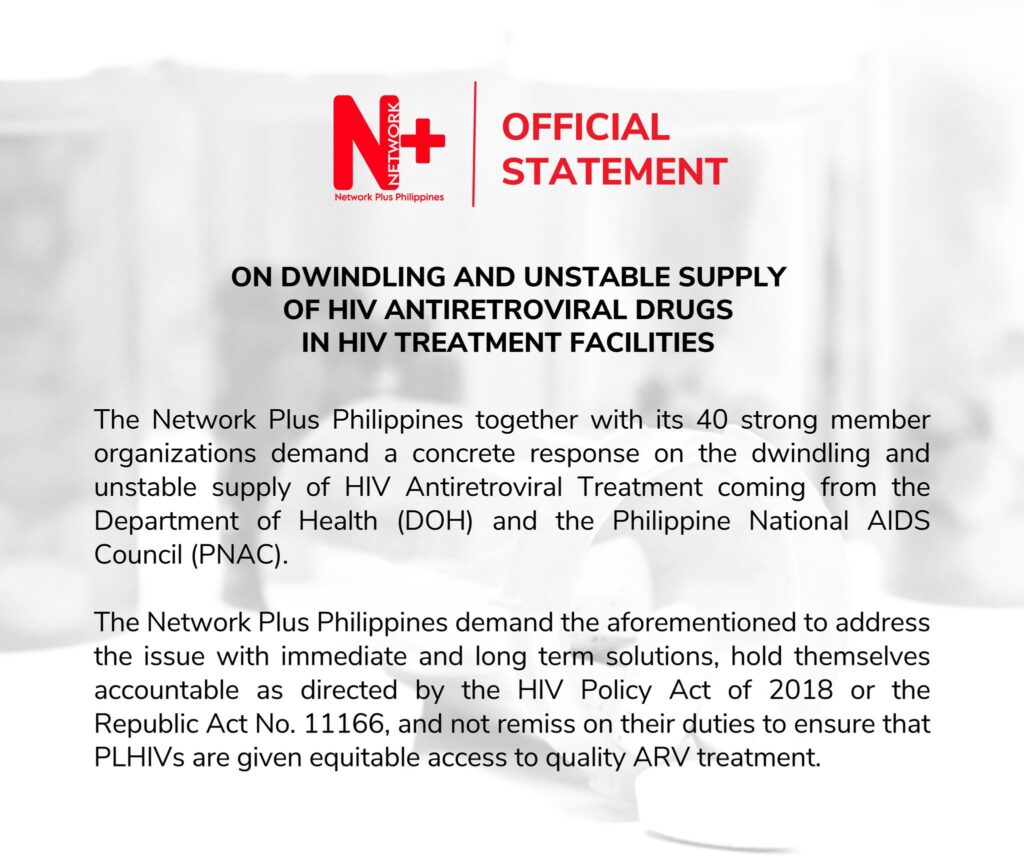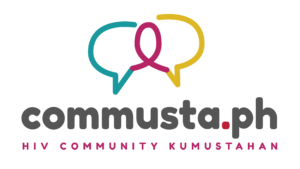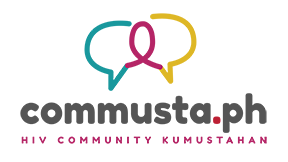Network Plus advocated for ARV supply stability through CLMS data
On January 20, 2023, Network Plus (N+) urged the Department of Health (DOH) to resolve the unstable supply of HIV antiretroviral (ARV) treatment as the network received numerous reports from the PLHIV community on alleged stock-out. It was raised that they even experienced receiving only “one bottle of ARV or even less”, which puts them in what they described as a “life-and-death situation” struggle.
N+ is the national network of organizations of PLHIVs and people advocating to strengthen HIV and AIDS response at the national level down to the grassroots. Elena Felix, Convenor of the network narrated that ARV stockout has resulted in a clamour from various groups in the country, as it has been a long time issue for the PLHIV community.

“Matagal ng nararanasan ng community ang ARV stockout… Pero nitong last year, nagistart ang clamour somewhere in Visayas Region. Nagemail na sila sa Network Plus stating that they have issues of stockout,” she said.
It also became a shared struggle with the facilities as many service providers have been putting efforts to continuously provide quality service for their clients. Ms. Felix shared, “Nahihiya sila [facilities] at naawa sa clients dahil walang naibibigay. Nanghiram na sila sa ibang karatig na bayan para lang may maibigay sila kahit na tag-15, or for 10 pcs ng ARV… nagagawan nila ng paraan in their own regions na naghihiram na nagpapalitan pero ayun nga hindi kase natin pwede sabihin sa ating mga clients na lagi na lang tuwing magtatanong sila ay may paparating. Hindi yun ang sagot sa clamour ng mga clients. At ang laging sasabihin ng mga clients ay it is a matter of life and death, nakasalalay dito ang aming buhay.”
In response to the emerging clamour, N+ released a statement urging DOH and the Philippine National AIDS Council (PNAC) to mechanise a “concrete response” and “to address the issue with immediate and long term solutions.” While the DOH responded about working on possible solutions, the PNAC requested for conclusive evidence on the alleged stock-out.
“…ang mayroon kaming evidence ngayon ay ang clamour, mayroon kaming screenshots, at kinonsolidate namin lahat ng clamours sa social media – clamour ng mga clients on shortage. Sinagot samin ni PNAC ay hindi ‘yan evidence kailangan evidence-based tayo,” Felix shared.
As N+ was convinced that their recorded narratives were not considered substantial to back their claims, the network sought the assistance of the Community-Led Monitoring system to provide the needed data.
“Ang ginawa ng N+ ay kinuha ang data ng commusta.ph. From there, may mga nakuhang data na sinasabi ng mga clients, complaints or report ng mga clients na may shortage talaga. ‘Yun ang ginamit ng N+ na evidence na kailangan ni PNAC. Mas mabigat ang data na nanggaling sa Community-Led Monitoring System. ‘Yun ang itinataya natin ngayon, na itong data na nakukuha natin from the community, magagamit din ng community for the advocacy.”
Felix also called for PLHIVs to continuously report similar cases as those are critical to enhancing the Philippine HIV response. “Doon palang sa pagbigay natin ng datos sa gobyerno ay may epekto na, paano pa kung mas marami ang makakagamit ng ating CLM tools. Makikita pa natin ang mga barriers kung bakit mayroon tayong mga lost to follow-up, bakit mayroon tayong may mga namamatay, bakit lumalala ang kalagayan nia. So kung dito, sa CLM data, makikita na natin na ito ang mga balakid. Pwede natin itong magamit sa pagbabago ng mga targets, mga plano.”, she said.
Felix also underscored that the data is intended for the delivery of quality services that needs to be recognized by the local government units.
“Sa government, lalo na sa local government, sana maappreciate nila na ung data ay para sa ikabubuti ng kanilang pagseserbisyo. Isang nakita ko sa isang treatment hub conference, lumabas doon na mayroon talagang shortage. At lumabas doon na, sinabi nila mismo na kinailangan nila ang community na magreport para matulungan sila doon sa hinaing ng shortage.”


